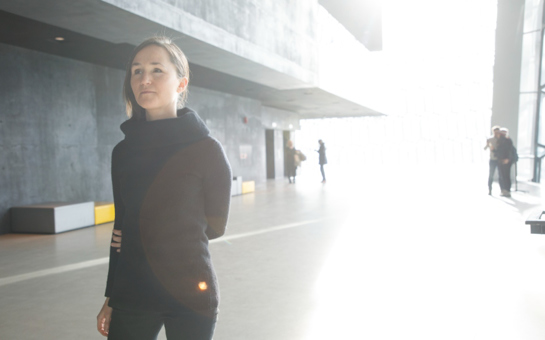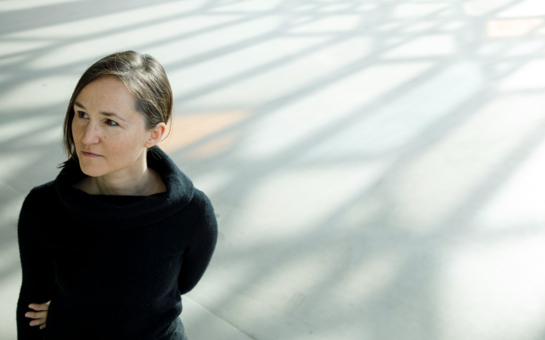On August 11 at the BBC Proms in London, the BBC Philharmonic conducted by Eva Ollikainen present the world premiere of ARCHORA by Anna Thorvaldsdottir. The performance will be broadcast live on BBC Radio 3 and subsequently on BBC Four television on Sunday 14th. The 20-minute work for large orchestra is inspired, in the composer’s words, by the notion of a primordial energy and the idea of an omnipresent parallel realm. In the following interview, Anna Thorvaldsdottir discusses the creative process, her approach to the orchestra and the concepts that shaped ARCHORA.
ARCHORA was commissioned by BBC Radio 3, LA Philharmonic, Munich Philharmonic, Orchestre de Paris, Iceland Symphony Orchestra and Klangspuren Schwaz. Further performances of the piece will take place throughout the 22/23 season.
You have said that you generally prefer not to include too much programme text with your music, but can you tell us a bit about the new work?
AT: Yes, in general I prefer to have a limited programme text as it is important to me that everyone is able to experience the music individually and find their own worlds in it. Also, the inspiration behind a piece is not something I am trying to describe through the music as such – it is a way to intuitively approach and work with the core energy, structure, atmosphere and material of the piece. The music then stands on its own, on its own terms.
The core inspiration behind ARCHORA centres around the notion of a primordial energy and the idea of an omnipresent parallel realm – a world that is both familiar and strange, static and transforming, nowhere and everywhere at the same time. The piece revolves around the extremes on the spectrum between the Primordia and its resulting afterglow – and the conflict between these elements that are nevertheless fundamentally one and the same. The notion of being present wherever you find yourself while also knowing that this reality will inevitably dissolve and recompose into something else is also an important part of the inspiration.
What does the title – ARCHORA – mean?
AT: The title refers both to the fundamental and primal – arché – and to this elusive parallel realm – chora. The Primordia represents the fundamental invisible energy that everything is born from, a deep and powerful energy that is subtle at the same time as it resonates and carries various echoes within itself. The internal image I have is earth growing and regenerating through itself – it is not about volcanic energy though, or about the universe as such – the inspiration is much more immediate but also abstract at the same time. As always, the qualities of the music are first and foremost musical and whichever inspiration finds its way into a piece is there because I perceive it as musically interesting.
Did the fact that the piece was a BBC Proms commission shape the piece in some way?
AT: Not directly per se — the commissioning orchestras or groups do always bring some inspiration to a new piece and it varies in which ways each time, but having full freedom with duration and the size of the orchestra is generally very important to me – I really like to have all the possibilities in front of me when I start dreaming on a new work, as much as that is possible.
One of the most distinctive aspects of your compositional voice is the way you seem to treat the possibilities of the orchestra almost like a unified instrument – can you tell us a bit about that?
AT: It is quite difficult to explain this briefly in words, but I do feel and think about the orchestra and all the individuals within it as a unity and part of it comes from experiencing the music as an ecosystem of sounds where materials continuously grow in and out of each other, growing and transforming throughout the process of the piece. There are many aspects and layers to this, and to how this is achieved, but one fundamental thing is how materials – for example textures, harmonies, and lyrical lines – move organically between instruments and performers, often with multiple layers happening at the same time, connected both to what is happening in that moment and to the overall structure as well. I also like to work with zooming in and out of layers in the music, to draw focus and to move between the micro and macro, both in the musical material itself and in the structural aspects of the music. It is about weaving everything together into a unified whole in a flow that feels natural and organic to me. A lot of this comes down to orchestration and I have developed techniques for doing this in my music, but fundamentally the music making is an intuitive process that the techniques serve to communicate. Ultimately, the way I think of the sound world within the orchestra comes from how I experience sounds and music, from how I listen internally.
"Anna Thorvaldsdottir's (b. 1977) "seemingly boundless textural imagination” (NY Times) and "striking” (Guardian) sound world has made her "one of the most distinctive voices in contemporary music” (NPR). Her music is composed as much by sounds and nuances as by harmonies and lyrical material – it is written as an ecosystem of sounds, where materials continuously grow in and out of each other, often inspired in an important way by nature and its many qualities, in particular structural ones, like proportion and flow. Anna’s music is widely performed internationally and has been commissioned by many of the world’s leading orchestras, ensembles, and arts organisations – such as the Berlin Philharmonic, New York Philharmonic, Los Angeles Philharmonic, Orchestre de Paris, City of Birmingham Symphony Orchestra, Gothenburg Symphony Orchestra, Munich Philharmonic, International Contemporary Ensemble, Ensemble Intercontemporain, BBC Proms, and Carnegie Hall. Her works have been nominated and awarded on many occasions - most notably, her "distinctive handling of the orchestra” (Gramophone) has garnered her awards from the New York Philharmonic, Lincoln Center, the Nordic Council, and the UK’s Ivors Academy."
Explore the music of Anna Thorvaldsdottir



.JPG)
